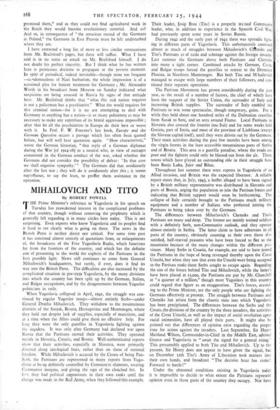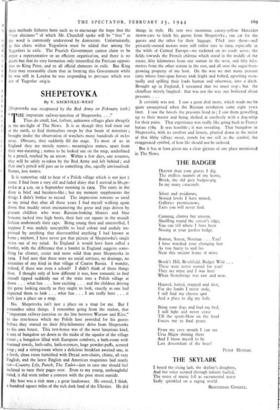MIHAILOVICH AND TITO
By ROBERT POWELL
THE Prime Minister's reference to Yugoslavia in his speech on Tuesday has reawakened interest in the complicated problems of that country, though without removing the perplexity which is generally felt regarding it in many circles here today. This is not surprising. Even experts who know Yugoslavia and its peoples find it hard to see clearly what is going on there. The news in the British Press is neither direct nor critical. For some time past it has consisted almost entirely of quotations from, or enlargements of, the broadcasts of the Free Yugoslavia Radio, which functions far from the frontiers of the country, and which has the definite aim of presenting to the world the exploits of the Partisans in the best possible light. News still continues to come from General Mihailovich's headquarters, but rarely, if ever, does it find its way into the British Press. The difficulties are also increased by the complicated situation in pre-1939 Yugoslavia, by the many divisions into which the country has been split up by the German, Italian, and Bulgar occupations, and by the disagreements between Yugoslav pdliticians in exile.
When Yugoslavia collapsed in April, 1941, the struggle was con- tinued by regular Yugoslav troops—almost entirely Serbs—under General Drazha Mihailovich. They- withdrew to the mountainous
districts of the Sanjak, Bosnia, Herzegovina and Montenegro, where they held out despite lack of supplies, especially of munitions, and at a time when the Allies could give them no effective help. For long they were the only guerillas in Yugoslavia fighting against the invaders. It was only after Germany had declared war upon Russia that the Partisans started their activities. They operated mainly in Slovenia, Croatia, and Bosnia. Well-authenticated reports show that their activities, especially in Slovenia, were primarily directed along ideological lines, rather than on those of national freedom. While Mihailovich is accused by the Croats of being Pan- Serb, the Partisans pre represented in many reports from Yugo- slavia as being definitely controlled by Communist elements, wearing Communist insignia, and giving the sign of the clenched fist. In fPct. they had political commissars in their own ranks until the change was made in the Red Army, when they followed this example.
Their leader, Josip Broz (Tito) is a properly trained Communist leader, who, in addition to experience in the Spanish Civil War, had previously spent some years in Soviet Russia.
During 1942 and the early part of 1943 there was sporadic fight- ing in different parts of Yugoslavia. This unfortunately consisted almost as much of struggles between Mihailovich's Clfrtniks and Tito's Partisans as of raids and sabotage against the foreign invader. Last summer the Germans drove both Partisans and Chetniks into many a tight corner. Combined attacks by German, Croat, and Bulgar troops forced the guerillas to retreat to the Dormitor Planina, in Northern Montenegro. But- both Tito and M;hailovich managed to escape with large numbers of their followers, and con- tinued their separate operations.
The Partisan Movement has grown considerably during the past year, as the result of a number of factors, the chief of which have been the support of the Soviet Union, the surrender of Italy and increasing British supplies. The surrender of Italy enabled the Partisans to win some spectacular, though temporary, gains. For a while they held about one hundred miles of the Dalmatian coastline from Susak to Senj, and an area around Fiume. Local Partisans in Slovenia also crossed the frontier into Italy and for some weeks held Gorizia, part of Istria, and most of the province of Ljubliana (except the Slovene capital itself), until they were driven out by the Germans. Their main activities during the past few months have been among the virgin forests in the least accessible mountainous parts of Serbia and of Bosnia. This area is a guerilla paradise, where the roads are poor and the fighters could only be blasted out from the air. Three towns which have p!ayed an outstanding role in their struggle have been Banja Luka, Jajce and Bihac.
Throughout last summer there were reports in Yugoslavia of an Allied invasion, and Britain was the expected liberator. A reliable report states that, in July, 1943, a leaflet alleged to have been, signed by a British military representative was distributed in Slovenia and parts of Bosnia, urging the population to join the Partisan forces and indicating that British support would soon be forthcoming. The collapse of Italy certainly brought to the Partisans much military equipment and a number of. Italians who preferred joining the Partisans to being taken over by the Germans.
The differences between Mihailovich's Chetniks and Tito's Partisans are many and deep. The former are mainly trained soldiers with a definitely Serb, non-Communist outlook, and they operate almost entirely in Serbia. The latter claim to have adherents in all parts of the country, obviously counting as their own those cl-s- satisfied, half-starved peasants who have been forced to flee to the mountains because of the many changes within the different pro- vinces. Many Serbs in Croatia, for example, are said to have joined the Partisans in the hope of being revenged thereby upon the Croat Ustashi, but when they saw that even the Ustashi were being accepted in the Partisan ranki these Serbs sought to escape again. Regarding the size of the forces behind Tito and Mihailovich, while the latter's have been placed at 15,000, the Partisans are put by Mr. Churchill at "a quarter of a million," though most Yugoslays in this country could regard that figure as an exaggeration. Tito's forces, accord- ing to the Prime Minister, are the only people who are fighting the Germans effectively at present. The struggle between Partisans and Chetniks has arisen from the chaotic state into which Yugoslavia has been precipitated. The differences between' the Serbs and the Croats, the divisions of the country by the three invaders, the activities of the Croat Ustashi, as well as the impact of social revolution upon racial animosities, have all played their parts. It might also be pointed out that differences of opinion exist regarding the proper time for action against the invaders. Last September, Sir Henry Maitland Wilson, Commander-in-Chief in the Middle East, advised Greece and Yugoslavia to " await the signal for a general rising." This presumably applied to both Tito and Mihailovich. Up to the present, Sir Henry does not appear to have given the signal, but on December 12th Tito's Army of Liberation took matters into their own hands, and broadcast "The decisive hour has come! Forward to battle!"
Under the abnormal conditions existing in Yugoslavia today it is impossible to decide to what extent the Partisans represent opinion even in those parts of the country they occupy. Nor have their methods hitherto been such as to encourage the hope that the " free elections " of which Mr. Churchill spoke will be " free" as the word is commonly understood by democrats. Unfortunately, to this chaos within Yugoslavia must be added that among the Yugoslays in exile. The Pourich Government cannot claim to be either a representative or an efficient organisation, and there is no doubt but that its very formation only intensified the Partisan opposi- tion to King Peter, and to all official elements in exile. But King Peter may reasonably claim that in forming this Government while he was still in London he was responding to pressure which was not of Yugoslav origin.



























 Previous page
Previous page